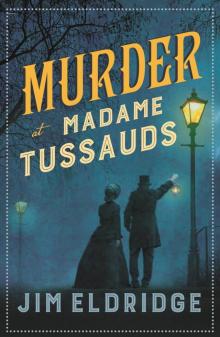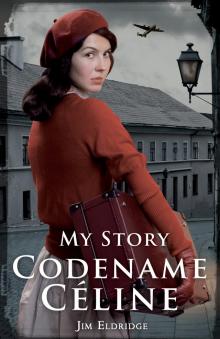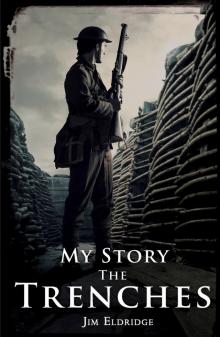- Home
- Jim Eldridge
Codename Céline Page 3
Codename Céline Read online
Page 3
One of the older women in our group raised her hand.
“Me,” she said.
“You will be with Marie.”
One of the older women from the other group stepped forward and offered her hand to the woman who said she was called Josephine.
“I am Marie,” she said. “Follow me.”
The two went off together towards the stairs, and Miss Penton called out: “Annette Simenon!”
The girl who’d been sitting in front of me on the bus raised her hand, and another of the older women detached herself from the group and came forward to greet her. I was surprised – after the first pairing of the two older woman, Josephine and Marie, I thought they’d decided to match us by ages: young with young. I wondered who I’d be paired with.
I found out with the next call, as Miss Penton looked at her clipboard and announced: “Céline LeBlanc!”
I put up my hand.
“You’re with Yvette.”
A dark-haired girl of about my age came towards me, smiling, and shook my hand.
“Yvette Debaille,” she introduced herself. “Come with me and I’ll show you to our room.”
I picked up my small suitcase and followed her up the wide staircase.
“We’ll only be sharing for a couple of days,” said Yvette. “As Miss Penton said, our group are ahead of you, so we’re off soon. Have you come far?”
It was asked so conversationally, so chattily, that I almost gave her the automatic answer of “Camden Town in London”, before I remembered the instructions I’d been given: say nothing about yourself. Instead, I smiled, and said: “The journey was fine.”
“The train wasn’t too crowded, I hope,” said Yvette. “Lately, every train just seems to be packed with men in uniform.”
Again, I smiled and shrugged and said “It was fine.”
By now we’d reached a door in the corridor, one of many, and Yvette stopped and said: “Here we are.” She opened the door and I followed her in. It was a bedroom with two single beds in it, a dressing table, a low coffee table and a couple of chairs. The décor was old-fashioned: wallpaper with patterns of flowers, mostly pink.
“I can’t stand this sort of wallpaper,” shuddered Yvette. “It reminds me of my Granny’s house. So old-fashioned!” She pointed to a door across the room. “We’re lucky, this room has got an en-suite! Our own bathroom and toilet! Most of the other girls have to use the communal bathroom at the end of the corridor.” She pointed to one of the beds. “That’s yours. You have to make your own bed, and I’d advise doing it before you go down to breakfast in the mornings. They’re very strict about order here.” She laughed. “But what do you expect, it’s a military place after all. That’s why we’re here.”
Again, I didn’t respond. Instead I put my suitcase on my allocated bed.
“Well, I suppose I’d better get along to Room 6,” I said.
Yvette grinned and winked.
“Don’t expect to have fun,” she said. “Miss Penton is a real old sour-puss. Think about the strictest teacher you ever had at school, and double it. That’s Miss Penton. Do you want me to show you where Room 6 is? This place is a bit of a maze until you get used to it.”
“Yes, please,” I said. It had already struck me that finding my way around Winterfold House was going to take some getting used to, and I didn’t fancy getting lost for the first lesson. That wouldn’t go down well with Miss Penton.
Chapter 4
The ten of us sat at our wooden desks in Room 6 and looked at Miss Penton, who stood in front of the blackboard and regarded us with a slightly disapproving expression. It was just like being back at school.
“Before we begin, I must impress on you the rules about security, not just while you are here, but ever afterwards.
“You will not be allowed to leave the grounds during the course unless accompanied or specially instructed to do so. You must never disclose at any time to anyone that you have been here, or at any of the other establishments you may attend. You must never recognize anyone who you have met here if you happen to meet them later elsewhere, except on official business.
“If you have promised to write a letter to anyone, it must be handed to me for censoring. You must not make any reference to that fact that your letters are censored.
“You will not be allowed to use the telephone here, or in the locality.
“Any breach of these rules will be viewed as a serious offence against the security of the nation.”
Miss Penton looked at each of us in turn with a grim expression on her face, making sure her words had sunk in. Then, satisfied, her tone softened a bit as she continued: “With that out of the way, let me bid you welcome. I hope you will enjoy your course here and will find it helpful to you.
“I know you will be aware of this already, but we feel it’s important for all new recruits to be reminded of the fact that this war is between us, the Allies – Britain, France, America, Russia, our Commonwealth countries, Australia, New Zealand, Canada, India – and the enemy, the Axis Powers: Germany, Italy and Japan. Here in F Division we concentrate on the situation in France, which has been under German occupation since the start of the War.
“The first aim of this organization is to damage the enemy’s means of communication and production. The second is to strain the enemy’s resources of manpower. The third is to undermine the morale of the enemy. If the morale of one side cracks, they lose the war, no matter how many troops they may have left in the field.
“The fourth is to raise the morale of the people in the countries occupied by the enemy, so that they will give us vital assistance when the right moment comes.
“How do we achieve all this? One word: sabotage.”
I looked around me at the others sitting at their desks, and saw that, like me, all of them had suddenly become sharply attentive at this one word. This was what we were here for, to disrupt the German war machine, and ultimately destroy it.
For the next two hours, Miss Penton held us captivated as she drew diagrams and rough sketches in chalk on the blackboard, illustrating the impact of properly carried out sabotage behind enemy lines.
“Just think of the impact if it were possible to isolate the enemy’s road and rail links, even for 24 hours, when the Allies are about to attack. It would be impossible for the enemy to get their troops to the threatened spot. The same applies to river bridges. Demolish a river bridge that is vital to the enemy’s means of communication and troop movements, and the enemy will have to detour for miles, causing a delay of hours or, in some cases, days.
“Enemy telephone lines. Disrupt them, and the enemy have no way of communicating where urgent assistance or reinforcements are needed.”
And so on, and so on; all of it gripping and making me want to be out there, in France, behind enemy lines, working with the Resistance, blowing up bridges and railway lines, cutting telephone wires.
One thing I learnt during the lecture that I hadn’t known before: that the French Resistance was not just one organization, but two. The French Resistance consisted of people who outwardly carried on their daily lives, while at the same time carrying out acts of sabotage against the occupying German forces. The other organization, the Maquis, was made up of freedom fighters living in secret camps in woods and forests, and some high in the Alps and other mountainous areas. They dedicated their whole lives to attacking the Germans. Both the Resistance and the Maquis worked with SOE agents.
Finally, as the clock ticked to one o’clock, Miss Penton dismissed us for lunch.
“You will find the canteen at the end of the corridor. You are allowed to leave the house, but – I would remind you again – not the grounds. Be back here at 1.45.”
The canteen was busy, mainly with men, I noticed. Some were in uniform, others in civilian clothes. There was no sign of Yvette, or the rest of the other g
roup who had shown us to our rooms. What did grab the attention of all of us as we lined up with our trays at the buffet-style canteen service, was the wonderful quality of the food on offer.
“Look at this! Real meat! And proper potatoes!” burst out Annette excitedly.
“They’ve got their own small farm here,” said Vivienne. “It’s at the back of the house. I saw it from the window of my room. Vegetable plots and a chicken run. And pigs.”
As I selected the different things to go on to my plate, I tried to remember when I’d last eaten something that looked as good and fresh as this. With the war had come rationing, with most food in short supply because attacks by German submarines, known as U-boats, had cut down the amount of food imported. Sugar had been one of the first things to vanish. Fresh fruit soon disappeared. Bananas were just a distant memory. Now and then apples were available, but not often, and not many.
Bread was also a problem because most of Britain’s wheat had come from America and Canada. The German U-boats had put a stop to that, so the quality of bread we had was pretty horrible. Cheese was also scarce because there weren’t enough cows in Britain to produce the milk to keep
everyone supplied.
For most of us, especially those in the cities, we ate Spam – a kind of compressed meat which was supposed to be made from pork, but I had my doubts; and snoek – a fish which some said was made up of a mixture of whale meat and eels.
Eggs were another luxury. We were rationed to just one egg a week each, so most of the time things like ‘scrambled eggs’ were made from powdered eggs. My taste buds told me there were a lot of other ingredients in that powder than just eggs. The same was true of ‘mashed potato’, which was a powder mixed with water, and Aunt Abbey said tasted as much like real mashed potatoes as wallpaper paste.
People had told me that things were better out in the countryside, because people had gardens where they grew their own food, and if they were friends with a local farmer then they might be able to get hold of a piece of meat. From what Vivienne said she’d seen from her window, it sounded like it was true.
We sat down as a group at a long trestle table and tucked into the food in silence, savouring the flavours which we’d all been missing for so long and thought we’d never taste again.
After the main course there was apple pudding and custard, real pudding with real custard. Again, this was something that had become a distant memory.
“If this is how they eat in the SOE, I’m glad I joined up!” chirped Annette happily. Then she saw the looks of disapproval on the faces of some of the others, particularly the scowls from Lisbeth and Vanessa, and she looked unhappily embarrassed. But only for a moment.
“Well, we’re all here together,” she said defiantly. “Everyone knows why we’re here.”
“You still shouldn’t say anything,” reprimanded Vivienne sharply. “You need to get in the habit of shutting up.”
Annette coloured.
“I thought we were supposed to be on the same side,” she snapped back defensively. “I thought we were all comrades.”
Vivienne didn’t respond, she turned her attention back to eating her apple pudding. The awkward silence was broken by Natalie who said: “I’m getting a cup of tea. I think they might have real tea here, not just the dusty sweepings we usually have to put up with.”
She headed towards a table where cups and saucers were piled up next to a steaming metal urn of hot water, and some tea pots. Most of the others got up to go with her, leaving me to finish my pudding with Annette.
“It’s not fair!” whispered Annette. “Everyone’s ganging up on me.” And I thought for a moment she was going to burst into tears.
Chapter 5
Back in Room 6, the afternoon lesson, again with Miss Penton, was something called Spycraft.
“The most important thing is you mustn’t stand out,” she emphasized. “Merge into the background. Not just in your behaviour, but especially in your clothes. Dress to fit. If you’re going to be in Paris, dress like the women in Paris do. If you’re in a country area, dress according to what local people wear. You’ll find our wardrobe department is the absolute best. They’ll be told which area to kit you out for, and what your cover is – whether you’re an office worker, a student, whatever. You will only wear the clothes and shoes they give you. Do not take your own. We don’t want you getting caught because your jacket has an English label on it.
“The same goes for hairstyles. Nothing fancy. Your hair will be cut and shaped to fit the local style.
“Language. You all speak French, which is why you’ve been selected, but beware of using phrases that could give you away as being from England, using everyday phrases you may have picked up living here. While you’re in the field you mustn’t just speak French, you’ve got to be local French in every way.”
And so on and so on. Those of us who’d been expecting something exciting and practical, like learning how to fire a gun, or how to blow up bridges, were disappointed. It was all about being lectured to. And we weren’t allowed to take notes. Jeanine had asked if we could have some paper to make notes, but Miss Penton was immediately frosty.
“I would remind you of my words this morning about the importance of security. Written notes of things I tell you here would be in breach of that security. You might throw them away later in your room, and a cleaner could pick them up from a wastebasket. How do we know that cleaner isn’t actually a spy, gathering vital evidence?”
And so we spent the afternoon committing the things we were told to memory, just as we had done that morning. By the time it came to bedtime, I was more than ready for sleep. Trying to remember everything Miss Penton told us, plus the fact that I hadn’t slept properly the previous night because of the excitement of coming to this place, I couldn’t wait to get into bed. But Yvette wasn’t sleepy. She wanted to chat.
“Isn’t this exciting?” said Yvette. “I’ve always wanted to do something like this!” She winked at me, conspiratorially. “So, what’s your real name?”
I looked back at her, surprised.
“What?” I said.
“Oh come on!” she said, and she was grinning happily. “We’re all in this together!” She lowered her voice and whispered. “My real name’s Susan! I’m not even French! Or even half-French! I suppose you’re half-French. Most of the other girls are.”
“We’re not supposed to talk about ourselves,” I
pointed out.
“Yes, but that’s in class, or when we’re with the others!” She looked at me, conspiratorial again. “Come on, what’s your secret?”
“I don’t have one.”
“Oh come on! Everyone’s got secrets!”
“That’s why they’re called secrets,” I said, which I thought was a clever reply and hoped it would shut her up.
It didn’t.
“What do you think of Miss Penton?” she asked, changing tack.
I shrugged.
“She seems okay.”
Yvette looked towards the door, as if worried there might be someone outside listening, and then whispered: “She’s German! Her name isn’t Penton at all! What do you think of that?”
Again, I shrugged as I started to get myself ready for bed.
“I don’t think anything of it,” I said.
“But you must!” burst out Yvette. “The Germans are our enemies! They started this war!”
When I didn’t reply, she also began to get her pyjamas out of her bedside cabinet.
“Isn’t this a fantastic place!” she sighed. “A real stately home! It’s so different from where I grew up.” There was a pause, and then she added. “Wigan. I grew up in Wigan. Do you know it?”
“No,” I said.
“It’s in Lancashire.” She groaned. “Narrow grimy streets. It’s a horrible place. What about you? I bet you were brough
t up somewhere grand. Somewhere posh. You sound posh.”
I laughed.
“No one’s ever called me that before,” I said.
“Oh come on, they must have! Unless the rest of your family all talk like you do. Where do they come from? Some posh part of England, I bet.” Then a thought obviously struck her, because she added. “Or some posh part of France!”
“We’re not supposed to talk about ourselves,” I reminded her.
“But there isn’t anything else to talk about!” she groaned. “Oh, it’s so boring!” She scowled. “If this is what being a spy’s like, I don’t think much of it.”
“Is that why you’re here?” I asked, pretending surprise.
“Of course! Isn’t that why we’re all here?” demanded Yvette. “That’s what you’re here for, isn’t it?”
“I’m here to learn shorthand and typing,” I said.
She shook her head.
“You are the weirdest girl I’ve ever met,” she said. Then she changed her tone to one of gentle friendly pleading again: “Please, at least tell me your real name!”
I looked at the clock.
“I think I need to be getting some sleep,” I said. “Another busy day tomorrow. Goodnight.”
And with that I got into bed.
Chapter 6
When I woke the next morning, I was surprised to find that Yvette had already gone. What was more, her suitcase and clothes had all gone from the wardrobe as well. I could only imagine that she and the rest of her group were being moved somewhere else.
This feeling was confirmed when I arrived in the canteen for breakfast, and saw Josephine, Vivienne and Vanessa standing by one of the widows, and looking pretty angry about something.

 Murder at the Ritz
Murder at the Ritz Murder at Madame Tussauds
Murder at Madame Tussauds Murder at the Manchester Museum
Murder at the Manchester Museum Blood On the Wall
Blood On the Wall 4.3.2.1
4.3.2.1 Jungle Kill (Black Ops)
Jungle Kill (Black Ops) Murder at the Natural History Museum
Murder at the Natural History Museum Murder at the British Museum
Murder at the British Museum Assassins
Assassins Hunk and Thud
Hunk and Thud Roman Invasion
Roman Invasion Big Rock and the Masked Avenger
Big Rock and the Masked Avenger The Last Enemy
The Last Enemy Urban Assassin
Urban Assassin The Deadly Game
The Deadly Game Alan Turing
Alan Turing The Lethal Target
The Lethal Target The Giant Rumble
The Giant Rumble Codename Céline
Codename Céline Death in the Desert
Death in the Desert Escape from Pompeii
Escape from Pompeii The Invisible Assassin
The Invisible Assassin Shadows of the Dead
Shadows of the Dead Jack Versus Veto
Jack Versus Veto The Trenches
The Trenches Murder at the Fitzwilliam
Murder at the Fitzwilliam Coming Home
Coming Home